
views
Getting Your Teen Interested in Exercise
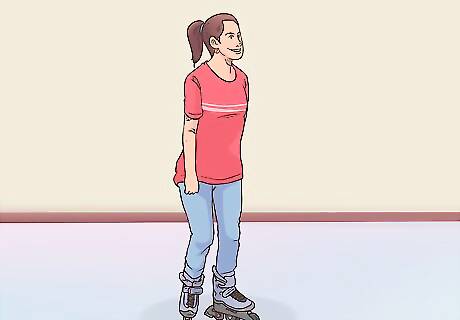
Make exercise fun. Exercising should be a positive experience. Do things with your teen that you know they enjoy and encourage them to try new activities that you think they will enjoy. Suggesting that your child pick a goal may also help to make it more fun for them, such as being able to run a 5K marathon or learning how to roller skate. Remind teens that dancing, skateboarding, and sports count as exercise.
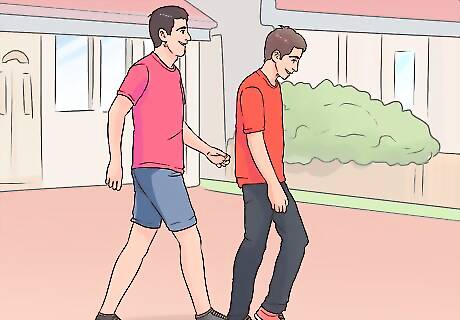
Start small if your teen is out of shape. If your teen hasn’t been getting much exercise lately, it’s important to help them ease into it. Encourage your child to begin with short exercises that eventually will lead up to a longer exercise regimen. Make sure that you join your teen in these activities as well so that you can lead by example. Let your teen experiment with types of exercise, and lengths of exercise sessions, so that they can determine on their own what they can and can’t do just yet. Start with low-impact exercise like walking around the block with your teen, dancing around the living room, or taking the stairs together. Praising teenagers for their effort and endeavors is important! Simply getting off the couch and taking the first steps to exercise is a big hurdle for many and should be rewarded, as this is the biggest challenge.
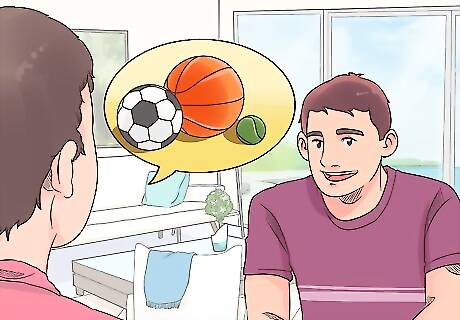
Suggest trying team sports. Team sports are a great way to help your teen get consistent exercise, since they’ll be expected to commit to a certain number of practices and games each week. If a teen can find a sport they enjoy with their friends, they are more likely to stick at it. Some team sports you might consider suggesting include soccer, lacrosse, football, tennis, softball, baseball, and swim team. In addition to the physical benefits they’ll receive, team sports help teens build confidence, develop new friendships, and improve their problem-solving skills.

Make it a family affair. By getting the whole family involved in exercise, your teen won’t feel like they are being singled out. Try coming up with fun activities designed to get the whole family involved, like a family bike ride or nature hike. You may even want to join in when your teen is doing their chores. You could also sign up for family events, like a relay, where you have to train as a group before the race. Get in the habit of playing tag or tossing a ball around after dinner each night.

Talk to your teen about the benefits of exercise. This doesn’t have to be a big sit-down conversation. Instead, casually mention that the whole family would benefit from improved diet and exercise. Make suggestions for fun activities you can do together, and see which ones your teen seems most interested in. Then, follow through with planning these activities. Don’t single your teen out to be the only one who needs exercise.

Be prepared for a little resentment. As a parent, you know that you are going to have to set some boundaries for your children and that they are often going to be angry about that. If your teen gets angry at you for suggesting they get more exercise, they may be feeling insecure about their own appearance. Be sensitive with your teen’s emotions. Reassure them that there is nothing wrong with the way they look, and that you just want the family as a whole to be healthier. Being angry and defensive is natural and acceptable. Being rude or openly disrespectful is not. Remind your teen that self-expression is fine but that you will not tolerate behavior that crosses the line.

Avoid talking about “shape” or “weight” at all. Instead, talk to your teen about staying healthy. This might open the conversation up more than a talk about weight would. It’s important to use positive self-talk when talking about your own body as well as your teen’s.

Set up an appointment with your teen’s doctor. It may be easier for your teen to hear that they need to exercise if the idea comes from a neutral third party. To make this appointment more subtle, schedule it for back to school (especially if there is a required physical) or before a class trip. If your child signs up for sports or activities, they may be required to have a physical for that as well.
Introducing Different Kinds of Exercise
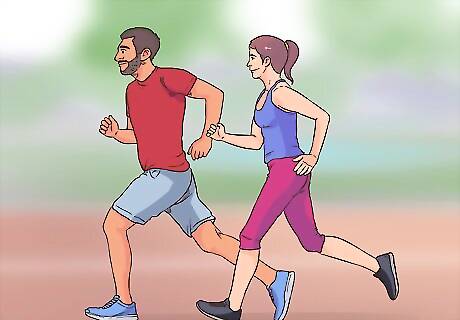
Teach your teen about cardiovascular exercises. Cardio exercises burn lots of calories and can even help to control your teen’s stress levels. Cardio can also help to promote healthy lungs and a strong heart, which can lower your teen’s risk of heart disease in the future. Begin by introducing low impact exercises like walking, jogging, swimming or biking. Bring your teen to the gym and show them how to use different cardio equipment, like treadmills, stationary bikes, or elliptical trainers.
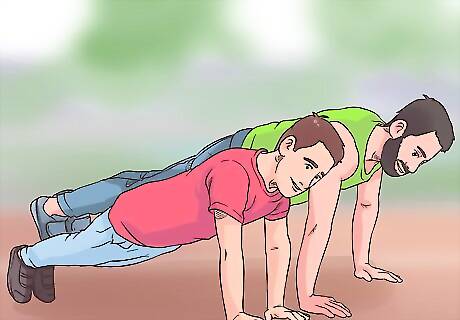
Show your teen how to practice strength exercises. These exercises can help your teen to tone or build up muscle, and can improve their strength and endurance. Strength exercises include using free weights, resistance training machines, resistance bands, or medicine balls. A strength training regimen may include push ups, squats, and lunges. Always make sure that your teen knows how to use resistance training equipment. If your teen uses the equipment wrong, or tries to push themselves too far, they could be injured. Consider bringing your teen to see a personal trainer to ensure they are using the correct form. Your teen should avoid powerlifting, competitive weightlifting, and bodybuilding, as these exercises can damage your teen’s growing bones, muscles, tendons, and joints. Look into strength training classes for teens at your local community center. This will be a good opportunity for your teen to learn weight room etiquette and proper technique.

Teach your teen the necessity of warming up and cooling down. If your teen has never played sports or done a lot of exercise, they may not be familiar with the importance of warm up and cool down activities. Teach them that warming up before exercise will help prevent injuries, while cooling down afterwards will help their muscles recover more quickly. Your teen can also work stretching into his or her exercise regimen by going to flexibility-specific classes, like yoga.
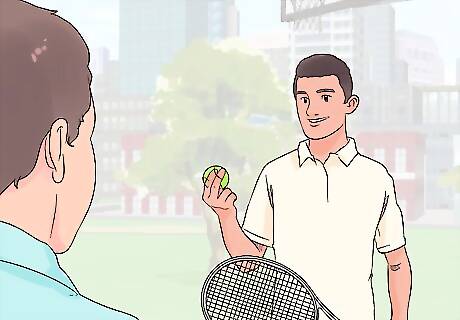
Introduce your teen to different sports. Your teen will be more likely to be excited about getting involved in a sport if they find one that they enjoy. Bring them to a community center or a local park, and encourage them to try out different activities to see what they like. Drop by a park with a basketball court, challenge your teen to a game of tennis, or host a touch football game in your yard for neighborhood kids to introduce a variety of sports.

Help your teen find exercises that match their interests. If your teen loves listening to music, try encouraging them to sign up for a dance class. If they're always bouncing around the house and climbing on the furniture, ask them if they'd like to try gymnastics or parkour.
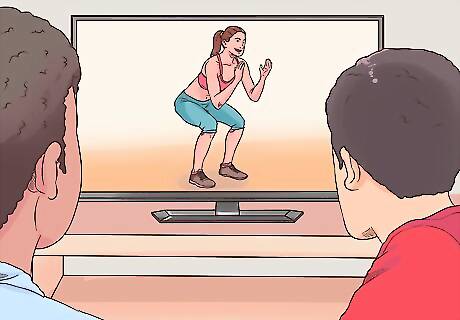
Try home exercise videos for a fun activity you can do together. The internet has made it easier than ever to find exercise videos you can try at home. You and your teen can try different videos together, including yoga, interval training, dance workouts, and more!
Promoting a Healthy Lifestyle
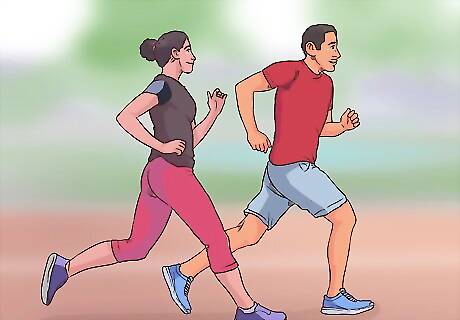
Model healthy behavior. If your teen sees that you never exercise, or that you don’t live a healthy lifestyle, they may be less inclined to make the effort to exercise. However, if eating well and staying active are priorities in your life, your teen will be more likely to follow in your footsteps. Find an exercise program that you really enjoy and actually look forward to doing, and talk to your teen about how good you feel after you’re finished working out. Avoid placing restrictions on your teen’s diet. Instead, be a good role model and eat the way that you want your teen to eat.
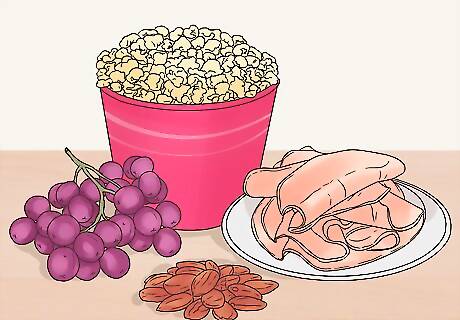
Provide healthy meals for your child. Healthy bodies require good foods like fruits, vegetables and whole grains. Keep healthy snacks like grapes, sliced turkey and chicken, almonds, and popcorn on hand to encourage your teen to eat healthy. Cook well-balanced meals for the whole family. Avoid keeping processed foods like chips or candy in the house.
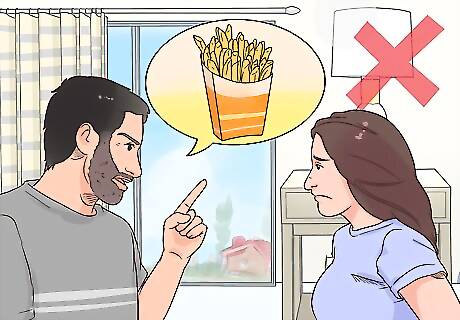
Don’t refer to foods as “bad” or forbid food them altogether. Your teen will be more likely to resent the fact that you have told them they cannot eat something, and they’ll be more likely to overindulge when they do get a chance to eat these foods. Instead, teach your teen that almost all foods are fine if you enjoy them in moderation. Instead, continue to provide healthy options that your whole family enjoys.
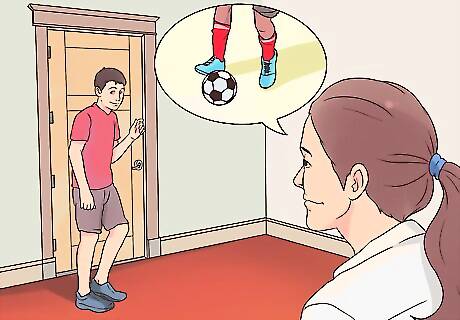
Encourage your teen not to be sedentary. Everyone deserves a break now and then, but your teen shouldn't spend too much time sitting in front of the television or computer. Being sedentary for long periods of time has been linked with heart disease, diabetes, cancer, and obesity. If your teen is sitting around because they are bored, ask them if they'd like to invite a friend over to play ball, invite them to help you with whatever you're doing, or send them outside to play if the weather is nice.

Make your meals a screen-free time. Watching television during meals encourages mindless eating, and it prevents you from actually paying attention to when they start to feel full. Getting absorbed in a television show can cause a teen to inhale their dinner so fast that they walk away convinced that they are still hungry. Activities like games or texting may also speed up the rate at which your teen eats.
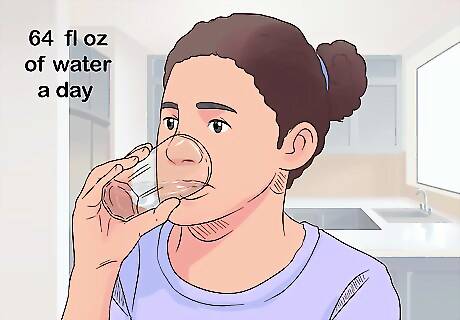
Remind your teen to drink 64 fl oz (1.9 L) of water a day. Staying hydrated is an important part of being healthy. Pack water bottles whenever you’ll be travelling as a family, and keep cold water in the fridge at home so it’s always easy to access. You may be able to encourage your teen to drink more water by getting them a cool thermos or water bottle decorated in a trendy design and monogrammed with their initials. If your teen is drinking too much soda and/or other sugar laden beverages, encourage them to keep these drinks to the weekends only or as a treat on special occasions.

Encourage your teen to get at least 9 hours of sleep a night. Teens generally need between nine and eleven hours of sleep each night. Sleep deprivation, or the chronic lack of restful sleep, increases the risk of metabolic disorders including obesity. It also impacts grades, behavior and social development as well. Help your teen to get more sleep by creating a relaxing, comfortable environment in their room. Limit screen time as well since this can affect sleep quality and quantity. Make sure to set a good example by shutting down your computer, turning off the TV, and putting away your phone at least 30 minutes before bedtime each night.
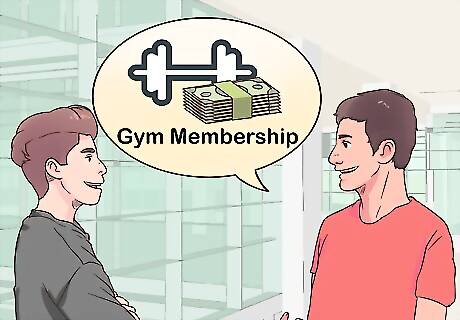
Offer to pay for a gym membership. Your teen might want to be more active, but they might not be sure where to start. Ask your teen if they'll agree to go to the gym 2-3 times each week if you pay for the membership.



















Comments
0 comment